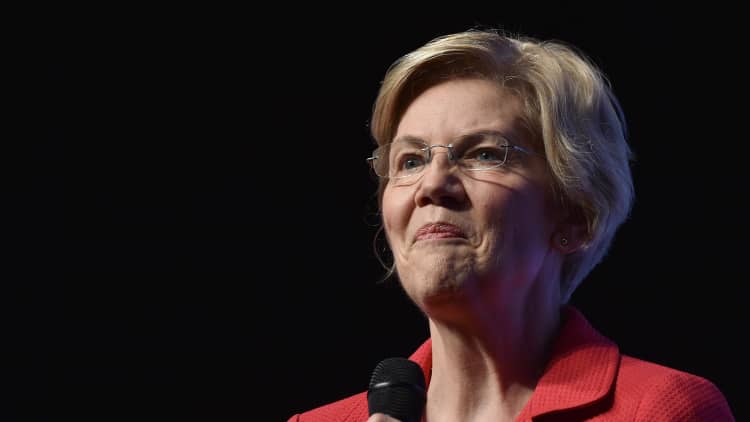Sen. Elizabeth Warren, Sen. Bernie Sanders and seven other lawmakers on Monday ripped a report defending the private equity industry, calling the research underpinning it a "sham."
The lawmakers sent a letter to Ernst & Young, accusing the accounting firm of helping the American Investment Council put together a report to defend the private equity industry that the politicians say skewed the facts.
"There are a myriad of other ways that corporate interests can wield their influence. One way they do so is by funding sham research — by consultants and researchers who receive big bucks for their work — to back up their views," Warren and the other lawmakers wrote to Ernst & Young Chairman and CEO Carmine Di Sibio.
"These studies are distorted and biased and misused in the regulatory and legislative and regulatory process, lending an air of legitimacy to corporate special pleading. The new EY report, prepared with and for a trade group for the private equity industry, appears to be a picture-perfect example of such sham study," the lawmakers wrote.
The report in question, released in October, paints a different picture of the private equity industry than the one put forward by populist politicians such as Warren and Sanders. The two senators are among the leading candidates for the Democratic presidential nomination next year.
The report highlighted the firms' role in providing growth equity and skilled managers for companies in need. Companies such as Domino's have successfully grown under private equity's watch before being handed off to the public markets through an IPO.
To support its claims, the AIC study highlights private equity's wage and employment contribution, which it pegs at $600 billion for 8.8 million workers. That amounts to an average salary in the U.S. private equity industry of $71,000 in wages and benefits, the report argues.
Warren and company took aim at that average salary calculation. They said it doesn't take into account the discrepancy between highly paid private equity executives and employees of a company owned by a private equity firm. To highlight their point, the lawmakers said private equity firm KKR, one of the three financial backers who owned Toys R Us before it liquidated, employed two senior executives who made more than $56.5 million in compensation in 2018 alone.
Representatives for Ernst & Young and KKR didn't immediately respond to requests for comment.
An AIC spokesperson said in a statement, "EY is a respected third party consulting firm and their new report shows exactly how private equity supports millions of jobs across America."
Meantime, the lawmakers argued, "a recent analysis of private equity buyouts from 1980 to 2013 found that average earnings per worker fell by nearly 2 percent, compared to similar companies not owned by private equity."
Warren and the lawmakers attacked other numbers in the Ernst & Young report, such as the "$1.1 trillion of value" AIC says was added the U.S. economy and the $174 billion it said the private equity industry paid in taxes.
The lawmakers said the report is "vague" about how it calculated the $1.1 trillion figure, demanding further clarification of the math used to calculate it. According to the report, "value-added" measures contribution to the U.S. GDP, which it says was 5% for private equity in 2018.
The taxes that private equity paid, said the letter, leave out the costs incurred by governments to support unemployment insurance for those laid off in bankruptcies of private equity-backed companies. The figure also neglects private equity companies' ability to deduct from their tax bills the debt they use to finance deals.
Warren and her fellow lawmakers demanded answers to a number of other questions in the letter, including how much Ernst & Young was paid for the report and how many jobs were created or lost in private equity-owned companies by industry.
Sen. Tammy Baldwin, D-Wisc., and Reps. Mark Pocan, D-Wisc., Jesus Garcia, D-Ill., Janice Schakowsky, D-Ill., Rashida Tlaib, D-Mich., and Pramila Jayapal, D-Wash., also signed the letter.
Warren's "Stop Wall Street Looting Act," unveiled this summer, aims to rein in the activity she argues is harmful for the average person. The proposal calls for private equity firms to carry the burden of debts and pension obligations of companies they buy and to limit their ability to extract fees, bonuses and dividends.



